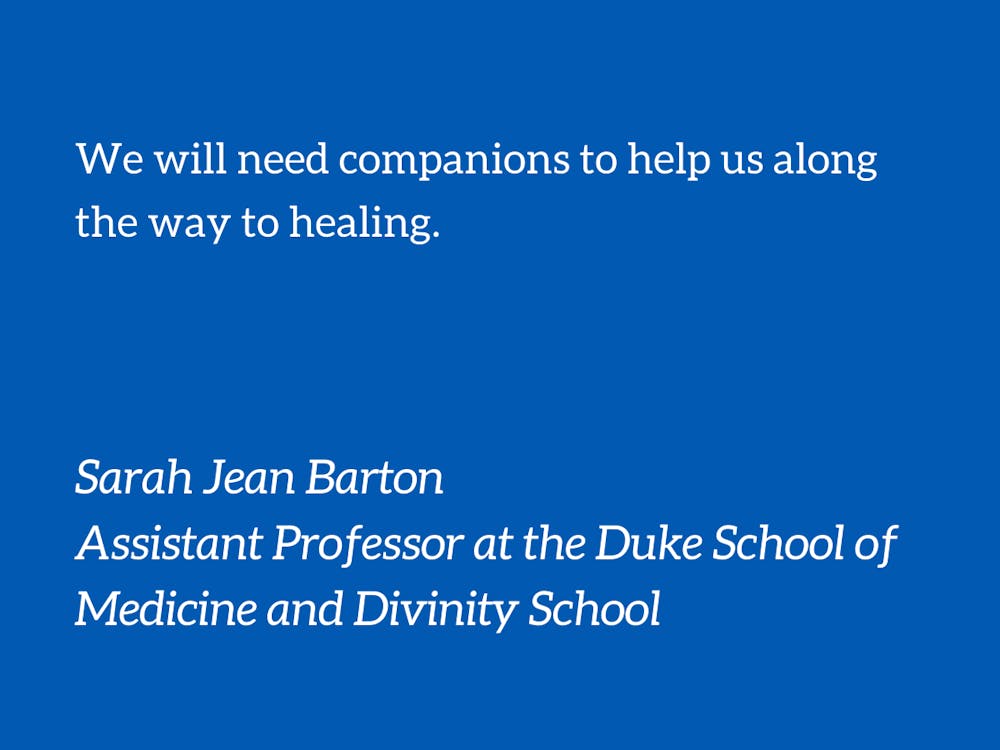April is national occupational therapy month. As an occupational therapist, I help my clients find new ways to access and participate in occupations - the doings of their everyday lives. Supporting individuals, groups and communities to fully embrace their life activities, from combing hair to collective bargaining, constitutes the heart of what occupational therapy practitioners contribute to the world.
I celebrate this month not only because I am proud of my profession, my colleagues, and the first ever cohort of occupational therapy doctorate (OTD) students here at Duke. I also celebrate the profound gift of healing that continues to emerge from the meaningful occupations of my life amidst the layered losses of Covid-19.
What exactly is occupational therapy? An often-misunderstood profession – “Do you help people get jobs?” “You’re just a special kind of physical therapist, right?” – the field formally emerged in the United States in the year 1917. Early practitioners of occupational therapy, informed by the Arts and Crafts Movement and settlement homes like the Hull House, focused on supporting, promoting, and optimizing the ways humans occupy their time.
Occupational therapists champion human doings as a distinctive mechanism of health. And these days, you’ll find occupational therapy professionals at work in diverse settings: from hospitals to prisons, from places that provide mental health care to home health, from schools to senior centers.
William Rush Dunton Jr., one of the field’s founders, expressed the central concern of occupational therapists through a powerful, 1919 credo:
That occupation is as necessary to life as food and drink. That every human being should have both physical and mental occupation. That all should have occupations which they enjoy…That sick minds, sick bodies, sick souls, may be healed thru occupation.
Five months ago, I experienced a complicated miscarriage. As I spent several weeks at home recovering from surgery, away from my work as an occupational therapist at Duke’s Lenox Baker Children’s Hospital and away from the classrooms where I teach OTD students at the School of Medicine, I became a quick companion with grief. My soul, along with my body and mind, felt overwhelmingly sorrowful. I found myself lying for hours on my old gray couch, binge watching Netflix.
But something began to shift after some unexpected acts of care. My priest showed up on my doorstep and handed me two “trashy” novels that we were to read together. My OTD students left posters on my porch, covered in paper hearts with handwritten well wishes, poems and prayers. One of my best friends called me daily, and we spent hours talking about everything under the sun, including our shared experiences of pregnancy loss.
In the aftermath of my miscarriage, these acts of care helped me begin to move within and through my sorrow. They coaxed me back into some of the fundamental occupations of my life: reading, teaching, and connecting with others. My priest, my students and my friend gently beckoned me to re-inhabit the doings that had filled my life with vibrancy before my miscarriage - occupations that would accompany me and my grief.
Of course, my spouse and I appreciated the typical kindnesses we received for weeks after our pregnancy loss: meals, flowers, cards and spa-themed items from Target. But it was these three particular acts of care that re-connected me with the heart of my profession – that our lives’ occupations offer us wells of healing.
This occupational therapy month, I find myself wishing this same kind of healing for all of us who have survived the myriad losses of Covid-19. Re-embracing the meaningful occupations of my life didn’t come from pulling myself together with a stiff upper lip. Instead, it emerged out of interdependence, from the care and support of others who know me well.
My companions and communities invited me to gently re-engage in meaningful occupations without ignoring or erasing my grief. Occupations don’t ask us to set aside our losses to seek healing; they don’t require that we do everything perfectly or independently. This way of going about our daily lives can help us find meaning again, especially amid suffering.
This April, as the realities of Covid-19 continue to evolve and the stresses of the semester intensify, occupational therapy month invites each of us back into doings that make us come alive; the occupations that buoy us through the complexities of our lives.
We will need companions to help us along the way to healing. Perhaps, for some of us, an occupational therapist will serve as one companion along the journey of finding new ways to modify, access, or participate in the things we had abandoned due to changes in our bodies, minds or souls.
Whatever the disruption, the grief, or the loss that accompanies you this season, at the end of another semester, from this occupational therapist to you: may you experience the healing power of occupation in the days to come. With companions, may you find ways back to the doings that bring meaning to your life, both this occupational therapy month, and beyond.
Sarah Jean Barton is Assistant Professor of Occupational Therapy and Theological Ethics, with a joint faculty appointment in the School of Medicine and the Divinity School.
Get The Chronicle straight to your inbox
Signup for our weekly newsletter. Cancel at any time.

